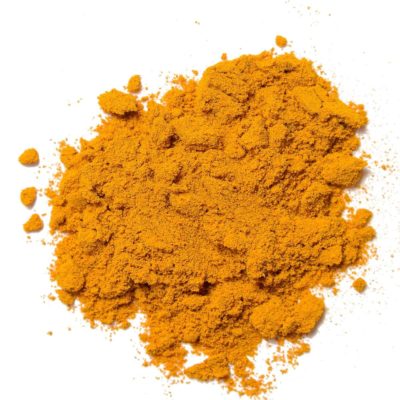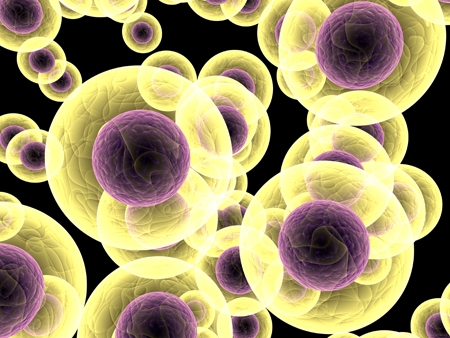Study in Mice Suggests that Compound in Turmeric May Reduce Anxiety and Promote Resilience to Stress
 Chronic stress is a risk factor for the development of mood and anxiety disorders. Researchers have begun to focus on how to promote resilience to stress. Curcumin is a micronutrient found in turmeric that has anti-inflammatory and antidepressant effects and may promote such resilience.
Chronic stress is a risk factor for the development of mood and anxiety disorders. Researchers have begun to focus on how to promote resilience to stress. Curcumin is a micronutrient found in turmeric that has anti-inflammatory and antidepressant effects and may promote such resilience.
Researchers studying human depression often design studies to see how mice with chronic social defeat stress respond to various interventions. Mice who are repeatedly menaced by a larger mouse begin to show symptoms that resemble human depression, such as social avoidance, lack of interest in saccharin compared to plain water (a stand-in for loss of enjoyment or anhedonia in humans), and anxiety.
In a 2018 article in the journal Neuropsychopharmacology, researcher Antonio V. Aubry and colleagues described the effects of curcumin on mice undergoing chronic social defeat stress. Mice who were given a diet that consisted of 1.5% curcumin showed a 4.5-fold increase in resilience to social defeat stress, measured by their performance during a test of social interaction. Among the 129 mice in the study, 64% showed the increase in resilience, the remaining 36% did not respond to the curcumin diet and had the normal ‘depressed’ response. The mice who responded well to curcumin released less of the stress hormone corticosterone, and they also had lower levels of the inflammatory marker IL-6.
All of the mice on the curcumin diet showed reduced anxiety during tests that forced them to travel through open spaces (when they prefer to stay in more enclosed spaces or move along the edges of an enclosure).
Amygdala Hyperactivity Linked to Family History of Depression
In new research presented at the 2016 meeting of the Society of Biological Psychiatry, researcher Tracy Barbour and colleagues revealed that youth with a family history of depression showed more amygdala activation in response to a threat than people without a family history of depression. This amygdala hyperactivity was linked to low resilience to stress and predicted worsening depressive symptoms over the following year.
In the study, 72 non-depressed youth were shown images of cars or human faces or cars that seemed to loom in a threatening way. Brain scans showed increased amygdala activity in participants with a family history of depression compared to those without such a history.
The amygdala is an almond-shaped part of the brain in the temporal lobe that has been linked to emotional reactions and memory, decision-making, and anxiety.
IL-6 in Blood and Bone Marrow Linked to Lack of Resilience to Stress
Rodents who are repeatedly defeated by larger animals often exhibit depression-like behaviors. In new research that researcher Georgia E. Hodes presented at the 2016 meeting of the Society of Biological Psychiatry, animals who are susceptible to these social defeat stress behaviors showed immune irregularities, including high levels of the inflammatory marker interleukin-6.
An intervention to prevent the mice from secreting interleukin-6 in blood and bone marrow took away their susceptibility to social defeat stress. When bone marrow from rodents with no interleukin-6 was transplanted into susceptible mice, the recipients showed resilience to social defeat stress. Conversely, a transplant from susceptible mice to those mice without IL-6 led to social defeat stress in the previously “immune” mice.
This research shows that the peripheral immune system, including blood and bone marrow, plays an important role in depression-like behaviors in mice.
Depression and Resilience Linked to Norepinephrine
Scientists have known for some time that heightened activity of dopaminergic neurons (neurons in the midbrain that contain the neurotransmitter dopamine) can make people vulnerable to depression. New research in animals suggests for the first time that noradrenergic neurons (those that contain the neurotransmitter norepinephrine) control the activity of dopaminergic neurons and that these noradrenergic neurons can make the difference between vulnerability to depression or resilience to stress. The research, published by Elsa Isingrini and colleagues in the journal Nature Neuroscience in 2015, showed that animals that cannot release norepinephrine are vulnerable to depression following chronic stress, but increasing the production of norepinephrine increases the animals’ resilience and reduces depression.
These findings may open up new avenues to treatment that target norepinephrine rather than or in addition to dopamine or serotonin, which is targeted by SSRI antidepressants, or selective serotonin reuptake inhibitors.
White Blood Cells Can Convey Resilience to Stress
Mice subjected to chronic defeat stress (being placed in the home cage of a larger, more aggressive mouse) behave in ways that resemble human anxiety and depression. In new research by Miles Herkenham and colleagues at the National Institute of Mental Health, in which they explored the adaptive immune system’s affect on mood, mice exposed to this type of stress showed increases in inflammatory cytokines in the blood (including TNFalpha, IL-1beta, IL-2, IL-3, IL-6, IL-17, and IFNgamma) compared to a control group. Interestingly, when white blood cells (lymphocytes) from stressed animals were transferred to a new set of animals, the recipient mice seemed to benefit from greater resilience to stress in a variety of ways.
Mice that received white blood cells from defeat-stressed animals had lower levels of TNFalpha, IL-1beta, IL-2, IL-3, and IL-17 than a control group that received white blood cells from unstressed mice. The recipient mice also exhibited reduced anxious and depressive behaviors in a litany of behavioral tests compared to both the group that received white blood cells from unstressed mice and a group that received a saline injection instead. Lastly, the recipients of the white blood cells from stressed animals showed more new neurons in the dentate gyrus of the hippocampus. (Hippocampal neurogenesis is decreased by stressors and increased by antidepressants.)
Herkenham and colleagues concluded that psychopathology is not just a downward spiral—the immune system plays an active role in adapting to stress, with lymphocytes being programmed by stress to provide antidepressant functions.
Editor’s Note: These data add a new twist to the studies of Scott Russo, who found that IL-6 secreted by white cells of animals subject to defeat stress was the cause of the depressive-like behaviors they exhibited. If IL-6 was blocked, the behaviors did not occur. Now it would appear from Herkenham’s work that something about the timing, the type of cytokines, or the transfer of the white cells conveyed protective antidepressant-like effects in this case.
Resilience Important for Mental Health
A symposium at the 2014 meeting of the American Psychiatric Association suggested that resilience may hold the key to healthy aging, and overcoming trauma and stress.
Resilience in Aging
Former APA president Dilip Jeste began the symposium with a discussion of successful aging. He noted the importance of optimism, social engagement, and wisdom (or healthy social attitudes) in aging. In a group of 83-year-olds, those with an optimistic attitude had fewer cardiovascular illnesses, less cancer, fewer pain syndromes, and lived longer. Those with high degrees of social engagement had a 50% increase in survival rate. Wisdom comprises skills such as seeing aging in a positive light, and having a memory that is biased toward the positive (the opposite of what happens in depression, where negatives are selectively recalled and remembered). Jeste encouraged psychiatrists to focus not just on the treatment of mental illness, but on behavioral change and the enhancement of wellbeing. He suggested asking patients not just, “How do you feel?” but instead, “How do you want to feel?”
Resilience in the Military
Researcher Dennis Charney gave a talk on resilience based on his work with people in the military, some of whom experienced post-traumatic stress disorder (PTSD). He cited a series of important principles that could enhance resilience. The first principle was to reframe adversity—assimilating, accepting and recovering from it. The second principle was that failure is essential to growth. The third principle was that altruism helps, as does a mission for the survivor of trauma. Charney suggested that a personal moral compass is also critical, whether this is based on religion or general moral principles. Other factors that are important for resilience include having a role model, facing one’s fears, developing coping skills, having a support network, increasing physical well-being, and training regularly and rigorously in multiple areas.
Charney and colleagues studied Navy SEALS who went through SERE (Survival, Evasion, Resistance, Escape) training. Those SEALS who had the highest resilience during this severe training exercise had the highest levels of the neurotransmitter norepinephrine and NPY (an antianxiety neuropeptide). NPY levels are low in people with PTSD. Charney and colleagues reasoned that giving a peptide that acted on the NPY-1 receptors intranasally (so that it could cross the blood brain barrier) might be therapeutic. In a rodent model of PTSD, the peptide prevented and reversed PTSD-like behaviors. Further clinical development of the peptide is now planned.
The Effects of Stress
Researcher Owen Wolkowitz described how stress accelerates the mental and physical aspects of aging. Telomeres are strands of DNA at the end of each chromosome that protect the DNA during each cell replication. Telomere length decreases with stress and aging. Read more
High Impulsivity and Low Resilience Characterize Euthymic Patients with Bipolar Disorder
Resilience is the ability to cope with adversity. While its role in anxiety disorder, post-traumatic stress disorder (PTSD), and unipolar depression has been investigated, there have been few studies of resilience in bipolar disorder.
A recent study presented by B. Cha et al. at the 2014 meeting of the International Society for Bipolar Disorders found that even euthymic patients with bipolar disorder show low levels of resilience (as rated on the Connor-Davidson Resilience Scale). Patients with a history of prior bipolar episodes had greater impulsivity (measured on the Barratt Impulsion Scale) and lower resilience than participants in a control group. Impulsivity in bipolar disorder was associated with lower resilience. Higher Clinical Global Impressions (CGI) scores, greater number of prior depressive episodes, and more impulsiveness were associated with lower resilience scores.
Both high impulsiveness and low resilience may be trait-related phenomena even in patients who have recovered from bipolar disorder. Number of prior depressive episodes is also associated with more cognitive impairment on multiple tests of executive functioning, attention, learning, and memory. Therapy aimed at problem solving and coping skills might help build resilience.







